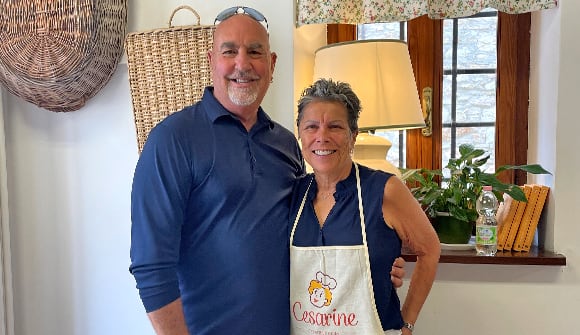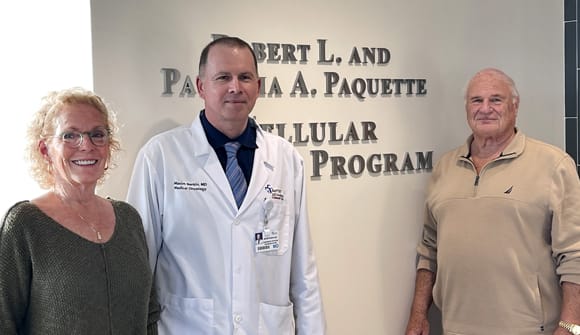Sudden breast swelling
5 facts about inflammatory breast cancer.
Article Author: Wesley Roberts
Article Date:

Most people know that a lump in the breast tissue could be a red flag for breast cancer. However, it’s not the only sign people should be aware of.
Inflammatory breast cancer (IBC) is a rare type that makes up only 1-5% of all breast cancers. Compared to traditional forms, IBC is fast-growing and changes to the breast occur rapidly.
Cynthia Anderson, MD, a radiation oncologist with Baptist MD Anderson Cancer Center, emphasized that though uncommon, it’s important for all women to know about IBC, starting with these five facts:
1. Symptoms are different than other breast cancers.
With traditional breast cancers, many people may notice a lump. IBC is different. According to Dr. Anderson, symptoms most commonly include:
- New redness of the skin
- Swelling of the breast
- Rough, "orange peel" skin instead of soft and smooth
2. IBC is aggressive and grows quickly.
People with IBC can develop rapid changes to the look and feel of the breast in just a few days or weeks.
“Because of the aggressiveness, we tend to give it a higher stage than typical breast cancer in the diagnosis process,” said Dr. Anderson, who explained IBC can grow and spread outside of the breast more quickly, as well.
3. Treatment is more aggressive.
People with other breast cancers may have one or two forms of therapy, like chemotherapy and surgery. Patients with IBC, however, usually undergo all three cancer treatments: surgery, chemotherapy and radiation, due to how aggressive it is.
4. There is still more to learn about IBC.
While it's true that IBC occurs most commonly in Black women and women under age 40, the exact causes are still unknown outside of those of traditional breast cancers. Dr. Anderson is Baptist MD Anderson’s principal investigator for research that explores what makes someone more at risk for IBC.
“Through the research with patients diagnosed with this type of breast cancer, we’re exploring things like differences in bacteria on the skin, where people grew up during their childhood and formative years, and other environmental exposures,” said Dr. Anderson.
The research is in collaboration with MD Anderson Cancer Center in Houston, Texas.
“Patients with IBC have the opportunity to provide additional blood work, skin samples and complete a series of questionnaires over a few years to help us learn more about it,” said Dr. Anderson.
5. You should advocate for yourself.
Early and accurate diagnosis makes a difference in treatment of and recovery from inflammatory breast cancer.
“One of the biggest challenges with IBC is that the diagnosis is often missed because many people feel they have something unrelated to cancer like an infection, injury or reaction to a bug bite,” said Dr. Anderson. “Also, the changes can be subtle when they first appear.”
Dr. Anderson recommended contacting your primary care physician immediately if you notice a change in your breast. She also encouraged patients to “stay on it” if symptoms persist, especially after a week of antibiotics.
“Keep going back to the doctor,” she said. “At a minimum, you should continue to seek care until you have your breast thoroughly looked at with a skin biopsy, mammogram and ultrasound. Don’t ignore it. If a workup remains negative but your symptoms persist, ask for a rapid referral to our Breast Surgical Oncology Department for a second opinion.”
Don't ignore the signs of IBC
If you notice rapid changes in the look and feel of your breast, contact your primary care provider or Baptist MD Anderson Cancer Center by filling out this form or calling 1.844.MDA.BAPTIST (1.844.632.2278).




